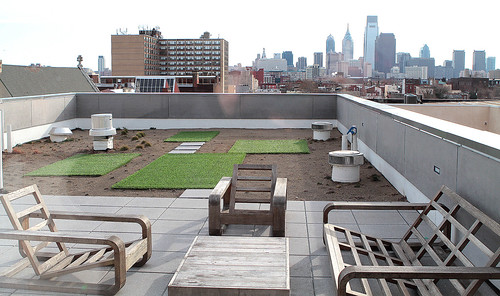
The Modules received a federal certificate for sustainable and water conservation features.
These days, it appears as if Temple and its surrounding community is moving in one direction: up. Enrollment is up 8,057 students from 2001, and the boom of student residents near Main Campus has been met by the creation of more student-geared apartment complexes.
While this construction and development is often seen as indicative of a new future of prosperity near Temple, it can also be threatening to the environment. But one realty company was recently certified for its attempts to neutralize its environmental impact.
Last month, TempleTown Realty received a gold Leadership in Energy and Environmental Design, or LEED, certification from the U.S. Green Building Council for one of its newest buildings, the Modules at TempleTown.
Located at 1417 N. 15th St., standing five stories and offering space for 160 residents, the Modules is now the first green building at Temple.
LEED certified structures must adhere to eight different categories of conservation and sustainability including water efficiency and indoor environmental.
One of the ways that the Modules was able to do this began with its modular design, from which the building derives its name. The structure is composed of more than 80 boxes that were created in an off-site factory and stacked on top of one another.
“[This method is] inherently sustainable because off-site factory construction allows materials to be used more efficiently so very little waste is produced and the waste that is created is recycled,” Jonathan Weiss, president of Equinox Management and Construction, said.
In addition to its sustainable construction process, the Modules is equipped with other environmentally conscious features including a green roof meadow, porous paving and an energy efficient water-source heat-pump system.
This heat-pump system cools and heats the entire building without any net energy use in the long term by recycling warm and cool air from room to room, drawing warm air from residents adjusting their thermostats to a lower temperature, and then depositing it to those seeking to raise it.
The building also seeks to reduce energy consumption by requiring residents to pay for their own utilities, in an effort to make energy use “as transparent as possible,” Weiss said. The hope is that if students are forced to pay directly for energy usage, they will be more responsible in their consumption.
Not only does the Modules seek to limit energy consumption and emissions that can lead to global warming, but it also aims to alleviate the effects of another more local environmental problem – storm water runoff.
When it rains in Philadelphia, any water that is not absorbed into the ground runs into the city’s sewer system after collecting contaminants from the streets. This polluted water then enters the region’s waterways. By equipping the building with a green grass roof and porous pavement, the Modules is able to keep 90 percent of the rainfall on its property from entering the water system. The roof is also open to residents to enjoy the view of Center City.
Few students said they chose to live in the building because of its environmentally friendly features.
“I did not decide to live here because it’s environmentally friendly,” said junior urban planning major Joe Daguman. “I chose the Modules because of it’s location close to campus. If I am walking home from the TECH Center late at night I feel safer.”
Some students cited the apartment rates as a reason for choosing the Modules.
TempleTown Realty offers furnished rooms in the Modules for $690 a month, a price in-line with many other off-campus living options.
Marketing Manager and resident of the Modules Star Bocasan said creating LEED certified buildings “makes more economic sense because they last longer and are cheaper to operate.”
TempleTown Realty hopes that the Modules will inspire others to start building environmentally friendly buildings throughout the area.
Weiss said that, for the time being, TempleTown is “excited to be leading the way at Temple.”
Amy Stansbury can be reached at amystansbury@temple.edu.



I’ve never heard of this modular building style before, but I admit I’m fascinated by it. I also love how they’ve been able to make Eco- both ecological and economical. Environmentally friendly usually means more expensive, but doesn’t seem to in this instance. That’s amazing news and a breakthrough for conservation and sustainability. Affordable products, services and living quarters are at the forefront of everyone’s minds in a down economy.